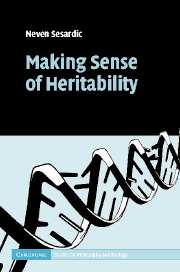Book contents
- Frontmatter
- Contents
- List of figures
- Acknowledgments
- Introduction
- 1 The nature–nurture debate: a premature burial?
- 2 A tangle of interactions: separating genetic and environmental influences
- 3 Lost in correlations? Direct and indirect genetic causes
- 4 From individuals to groups: genetics and race
- 5 Genes and malleability
- 6 Science and sensitivity
- 7 Conclusion
- References
- Index
1 - The nature–nurture debate: a premature burial?
Published online by Cambridge University Press: 22 September 2009
- Frontmatter
- Contents
- List of figures
- Acknowledgments
- Introduction
- 1 The nature–nurture debate: a premature burial?
- 2 A tangle of interactions: separating genetic and environmental influences
- 3 Lost in correlations? Direct and indirect genetic causes
- 4 From individuals to groups: genetics and race
- 5 Genes and malleability
- 6 Science and sensitivity
- 7 Conclusion
- References
- Index
Summary
The nature-nurture problem is nevertheless far from meaningless. Asking right questions is, in science, often a large step toward obtaining the right answer.
Theodosius DobzhanskyA CONVENIENT JINGLE OF WORDS
Heritability is basically a measure of the strength of genetic influence on phenotypic differences. The emphasis is on the word “differences.” It was Francis Galton who initiated a systematic study of human variation in the nineteenth century. He chided statisticians of his time for being only interested in the mean values and never in differences:
It is difficult to understand why statisticians commonly limit their inquiries to Averages and do not revel in more comprehensive views. Their souls seem as dull to the charm of variety as that of the native of one of our flat English counties, whose retrospect of Switzerland was that, if its mountains could be thrown into its lakes, two nuisances would be got rid of at once.
(Galton1889: 62)Heritability is usually defined as the proportion of phenotypic variation that is due to genetic differences. So giving a particular value to a heritability estimate of a given trait is solving the nature-nurture equation in that specific context. There is no general answer to the nature-nurture question. As J. B. S. Haldane said: “The important point is to realize that the question of the relative importance of nature and nurture has no general answer, but that it has a very large number of particular answers” (Haldane1938: 34). Dobzhansky concurs: “There is not one nature-nurture problem but many” (Dobzhansky1956: 21).
- Type
- Chapter
- Information
- Making Sense of Heritability , pp. 11 - 47Publisher: Cambridge University PressPrint publication year: 2005
- 1
- Cited by



